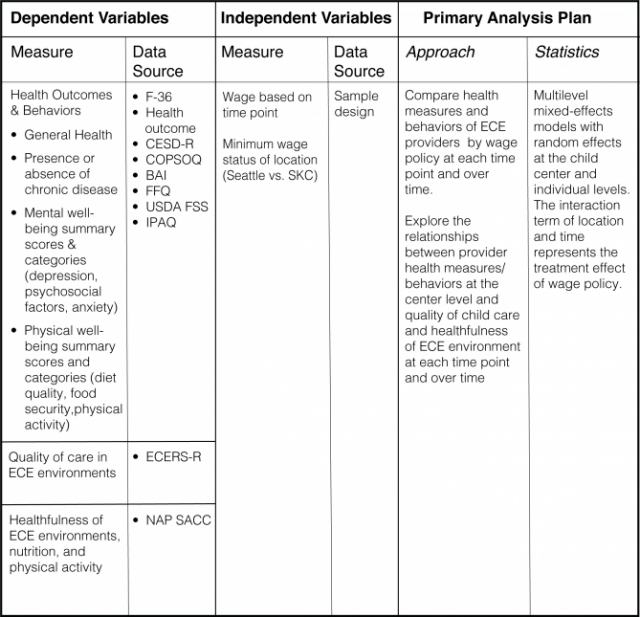Project Summary
The project team evaluated the impact of the implementation of an increased minimum wage ordinance in the early childhood education (ECE) setting. The team examined how changes to the minimum wage affected the health of ECE providers and how provider health relates to the quality of the ECE environment. The study was designed to compare minimum wage change outcomes over time in Seattle, WA and South King County, WA to the control city, Austin, TX.
Research Questions/Aims
- How does the health of ECE providers relate to the quality of the ECE environment?
- How do changes in minimum wage over time in Seattle, King County, and the comparison jurisdiction affect wages, provider health, ECE environments, and the relationships between them?
- Does provider health mediate the relationship between wages and the ECE environment?
Actionability
- Inform investments in the ECE setting and workforce by providing information on how available resources impact the health and wellbeing of both daycare teachers and attending children.
- Provide insights about whether and how minimum wage and other labor regulation changes impact the health and wellbeing of childcare teachers and children, as well as the broader organizational and sectoral implications of such changes.
Results
Using baseline data from an ongoing study, Exploring the Effects of Wage on the Culture of Health in Early Childhood Education Centers, Jennifer Otten of the University of Washington and coauthors found that ECE teachers earned low wages, experienced poor mental well-being, and lacked access to enough food for an active and healthy life. Lower wage teachers were more likely to work at centers that did not offer health insurance, paid sick leave, or parental or family leave. Study authors suggest health and equity-related outcomes could be improved by helping centers provide more support and flexibility to teachers (for example, offsetting workers’ benefit costs or reducing teacher-to-child ratios to reduce stress).
In a follow up study, researchers found that for the early child care and education teachers, very low and low food insecurities were associated with higher odds of depression when compared to being food secure. Study findings shed light on potential opportunities to help improve the situation. Policies and center-level interventions that address both food insecurity and depression in the ECE workforce may be warranted, in order to protect and improve the health of this valuable, yet vulnerable, segment of the U.S. workforce. Potential policy-level strategies in the U.S. could include incorporating ECE workers as recipients of the federally reimbursed nutritious meals and snacks already served on-site to children via the Child and Adult Care Food Program or adopting legislation or provisions that improve financial security for ECE workers (e.g., tax credits, raised minimum wage). Centers could also provide workers with resources and connections to nutrition education and food assistance programs, as misunderstandings and uncertainty around eligibility for food stamp benefits are fairly common, and population-specific outreach and education around food assistance participation eligibility may encourage participation. Finally, centers could include routine staff training on mental health and emotional well-being, coping skills, and stress management.
Outcomes & Methodology

Natural experiment

University of Washington, School of Public Health
University of Texas at Austin
Child Care Aware of Washington State
Refugee Women’s Alliance
A Place to Grow
Stroum Jewish Community Center
Community Day Center for Children